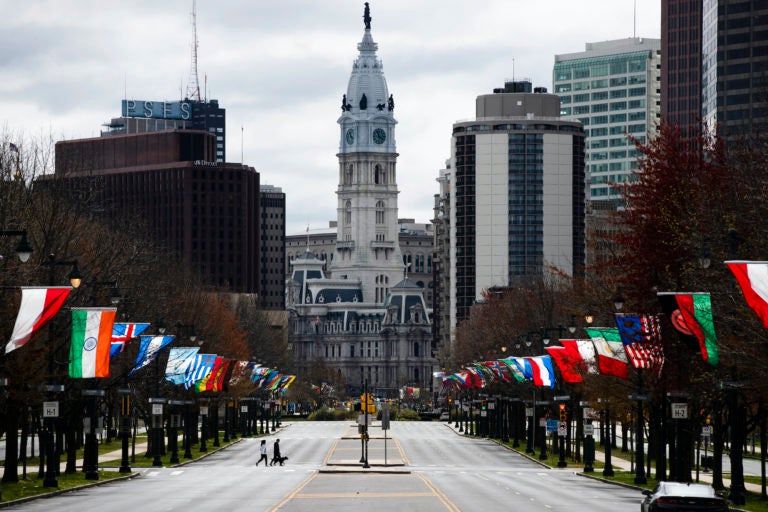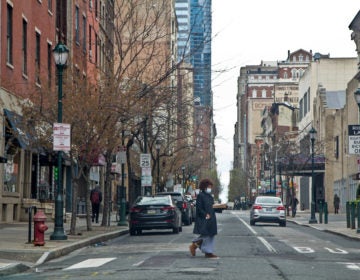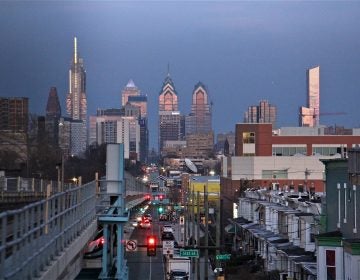‘Painful cuts’ to city services anticipated as Philly faces coronavirus’ staggering costs
Numerous Philadelphia councilmembers say that they have been told to expect “deep cuts” to services and operating departments. None have seen details.

The Benjamin Franklin Parkway in Philadelphia, Friday, April 3, 2020. (Matt Rourke/AP Photo)
Philadelphia Mayor Jim Kenney says the city can expect deep and painful budget cuts in the wake of the coronavirus pandemic.
He announced on Tuesday that the initial $5.2 billion budget he proposed in March — “feels like an eternity ago,” he told reporters — would be scrapped and a new budget proposal delivered to City Council by May 1.
A memorandum from the Mayor’s Budget Office on “COVID-19 Fiscal Impacts” illustrates the immense challenges Kenney faces in crafting the new budget proposal.
The city expects to enter fiscal year 2021, which starts on July 1, with “low or no fund balance.” Prior to the catastrophe, Philadelphia anticipated having a fund balance of $352 million.
The $2 trillion stimulus enacted by the federal government provided an infusion of funding for states, of which Pennsylvania received $5 billion. It is unclear how much of that will be allocated to Philadelphia, and city policymakers are not banking on additional aid from Washington D.C.
“Much of the federal funding approved to date is one-time, but we anticipate recurring negative impacts, particularly revenue losses, over a much longer or permanent time frame,” the memo reads.
The pandemic’s impact on Philadelphia’s revenues has been immediate. The Hotel Tax, Amusement Tax, Liquor-by-the-drink tax, and Use and Occupancy taxes have all basically been zeroed out.
With unemployment surging, wage taxes — which comprise roughly 45% of the city’s annual revenue — have obviously taken a hit. But many of those who are still working are also no longer contributing to city coffers.
Forty percent of the city’s wage tax collections come from commuters, but this essential levy is not assessed on those who work from home. In fiscal year 2019, for example, commuters brought in $640 million.
“There is potential for permanent shifts to work from home for some, creating a large and lasting negative impact on City finances,” the memo reads.
As the city faces steep declines in revenue, costs have unexpectedly risen too. Testing sites, protective equipment, stepped up cleaning and quarantine facilities all cost money the city hadn’t planned on spending.
The city’s initial offering of time-and-a-half pay to essential municipal workers didn’t last, but labor costs are expected to spike nonetheless.
“To maintain existing services, the City initially offered a pay incentive which was not sustainable,” the memo reads. “With staff facing childcare and healthcare needs at home absenteeism is expected to rise. To maintain core functions will require overtime or other added labor costs; alongside service level reductions.”
In a heartfelt memo sent to all members, City Council President Darrell Clarke reinforced the administration’s frightful warnings.
“The projections are grim,” Clarke warned. He quoted the administration’s warning that the city will have to enact “several hundred million dollars of reductions” compared to earlier budget proposals.
Numerous councilmembers say that they have been told to expect “deep cuts” to services and operating departments. None have seen details. Mass furloughs of non-essential workers are expected. At the state level, Gov. Tom Wolf has already begun laying off thousands of public employees.
State and municipal governments have to balance their budgets annually, unlike the federal government. During the Great Recession, Congress didn’t offer enough aid to state and local governments to forestall deep cuts to programs and mass layoffs of public sector workers. This austerity program then further deepened the economic downturn.
“At the end of the day, [after the Great Recession] states ended up relying on spending cuts for 45% of their budget gap closing and that held back economic growth,” said Elizabeth McNichol, a Senior Fellow with the Center on Budget and Policy Priorities. “[The aid to states in the pandemic stimulus] is not going to be enough to close the size of the budget gaps that we’re likely to see. More federal aid is really really needed.”
Clarke encouraged councilmembers to come up with solutions to address the needs of Philadelphians who are hungry or in danger of losing their homes.
“But we must be mindful that our City’s coffers are profoundly threatened by this virus,” he wrote. “Any steps we consider must respect the fact that the City’s own revenue stream is in peril.”
The City councilmembers WHYY spoke with were unaware of where the cuts could be expected. Budgets always show a government’s priorities, but this time around that may be best reflected in what services the culling.
Many councilmembers made arguments for their long-standing policy interests, like Councilmember Helen Gym’s argument for continued funding for eviction court reform and guaranteeing low-income renters lawyers (called “right to counsel”).
“I believe one of the major priorities that has come through locally is the need to address housing, rental assistance, mortgage payments,” said Councilmember Helen Gym. “I’m hoping that some of the stimulus money is driven in those areas so we can protect some of the programs and policies that have been established to keep people stable, like right to counsel.”
Councilmember-at-large Allan Domb said that if aggressive steps weren’t taken, he understood the city could be between $200 and $400 million “in the hole” next year.
“My messaging is that we can’t tax our way out of this,” said Domb. “This could be an opportunity to revisit our tax structure. This is a tremendous opportunity to figure out how to help existing owners of businesses expand and create more good-paying jobs. If we don’t do this now, what would be a good time to do it?”
WHYY is your source for fact-based, in-depth journalism and information. As a nonprofit organization, we rely on financial support from readers like you. Please give today.






![CoronavirusPandemic_1024x512[1]](https://whyy.org/wp-content/uploads/2020/03/CoronavirusPandemic_1024x5121-300x150.jpg)



